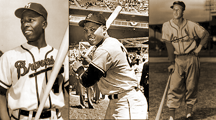Wednesday, December 6, 2006
Rounding Out the Reich Top 25
SS Marty Marion*
3B Bob Elliott
OF Dom DiMaggio
Del Ennis
Minnie Minoso*
Rocky Colavito*
Vada Pinson*
P Carl Mays*
Mickey Lolich*
*Appears on 2007 ballot
Thursday, October 12, 2006
A Short Test
 Consider the effects of the following principles on our identification of relevant candidates.
Consider the effects of the following principles on our identification of relevant candidates.Existing membership averages 20 per decade for our review period. Some believe the level is too high; there is little or no sentiment for substantial increases in the number of Veterans. Although, some candidates may be qualified, there is no evidence that numerous non-members have been overlooked or treated unfairly.
An average of 10 or more Hall members per decade present performance credentials satisfying almost everyone regarding their H/F qualifications. This includes most members ranking top 100 for the century and some others described as "high consensus".
One of the dynamics of membership practices is that approval of one creates pressures, often logical, for induction of others seemingly close in credentials.
If an average of 20 per decade suggests both ranges of achievements and an approximate outer membership level and approximately 10 per decade present "definite" or "nearly definite" qualifications, it follows that almost all of the remaining inductees should bear substantial relationships to those with "definite" or "nearly definite"qualifications. Such relationships usually involve status or statistical features similar to or derived from features presented by"upper level" or "high consensus" members.
It is also necessary and appropriate to consider candidates who fall short as "all stars" or statistical leaders. Such candidates present features involving "history" or "contributions to the game". Few members have been inducted substantially for specialized reasons.
To qualify in any election of Veterans, candidates with some plausible credentials must be found to rank at least among the top 10 candidates and to deserve induction into the games most exclusive and select honorary society. To meet both of these requirements, candidates must present compelling features.
Pete Rose

Imagine that Pete Rose is reinstated from the disqualified list and becomes Hall of Fame eligible. Imagine that you are a voter, obligated in conscience to fairly judge his qualifications under the criteria and to apply the criteria in letter and spirit.
Reinstatement would not imply innocence. Rose has finally “confessed” to serious misconduct but not to the full range of the allegations.
As a manager, he committed one of the game’s most serious crimes and did so flagrantly. Rose’s conduct is much different than Orlando Cepeda’s, whose offense occurred after his retirement and was not directly related to the game.
How would I vote? No one can contest Rose’s playing credentials. However, unless the character provision is ignored, a guilty Pete Rose presents the classic situation for application. If he is admitted, who could ever be excluded for lack of integrity? Just scratch out the provision and forget about it- forever. If reinstated, maybe Hal Chase and Ed Cicotte (of Black Sox fame) could be next! (I mention them instead of Joe Jackson, because these involvements were more extensive and undisputable. Quite apart from Rose, maybe it is time to reinstate Buck Weaver, for whatever purpose would be served.)
By the way, I am familiar with John Dowd’s skilled performances as a federal attorney. Despite years of denial by Rose, Dowd’s investigation and conclusions seemed solid. Even Rose's confession (for profit) in his recent book works against him, because his present version compounds the character flaws demonstrated by years of direct falsehood and allegations/insinuations of wrongdoing by baseball’s establishment.
While I was writing Waiting for Cooperstown, a “steroids scandal” has surfaced. How will the candidacies of power hitters with classic achievements be affected? The Hall includes several members whose character flaws can be fairly well documented: drunks, womanizers, racists, even some with criminal records. Some allegedly threw “spit balls” and other illegal pitches. Performance counts! That favors Rose (if reinstated) and many others. The gambling aspects strike at the heart of the game. That’s a difference.
My immediate thought is that these judgments should not be made solely by individual voters on a case-by-case basis. As sure as anything, inconsistencies will occur. The organizations should develop policy guidelines.
Baseball’s Greatest Living Player

With the passing of Joe DiMaggio and Ted Williams, there has been much discussion as to who now should be regarded as baseball’s greatest living retired player. Many favor Willie Mays or Henry Aaron. Don’t forget Stan Musial.
Mays certainly displayed the most exceptional range of skills. Aaron hit home runs and produced other big hits with amazing consistency. Musial was remarkable in the following: career averages and quantities, number of prodigious and star-type seasons, seasonal batting leaderships, MVP awards and second-place finishes, and impact on the times.
Both Mays and Aaron also were remarkable in the same areas of achievement, and superior to Musial in some of them. They had the advantage of 162-game schedules during more of their prime seasons. Musial’s advantage involves career averages and the seasonal leaderships.
In time, Barry Bonds may succeed to this distinction.
By the way, I always have ranked Musial ahead of DiMaggio and Williams. DiMaggio was the "big winner.” Williams had the most spectacular seasons. Musial’s career was longer and fuller, both in career quantities and number of star quality seasons. It wasn’t Williams’ fault he missed so much time to military service and injury, but Musial continued to excel and accumulate. I wouldn’t object to a triumvirate.
Sam Reich, 10/06/2006